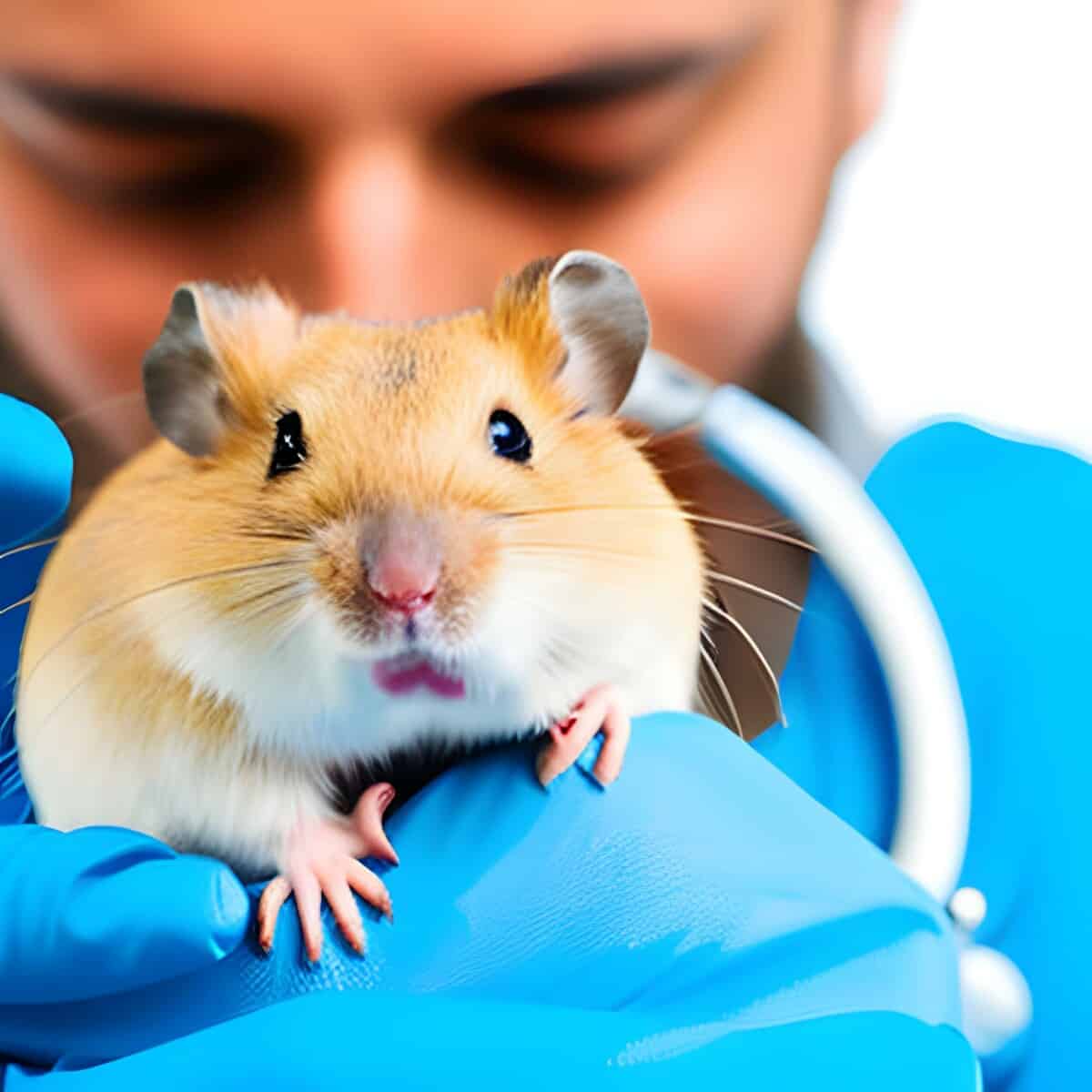Our playful, curious, and generally easy-to-care-for furry pets can experience some injuries that require attention from their owners.
Hamster skin sores are open wounds or bumps on the surface of the skin that got infected.
These infections can lead to the formation of closed wounds filled with pus, causing discomfort and pain for your hamster.
Treating sores at early stages with your vet’s supervision prevents further damage and it is considered a mild issue.
In this piece, we will guide you through causes and instructions on how to help your lovely hamster recover fast.
Hamster Skin Sores: Table of Contents
Why is my Hamster Getting Sores? Causes of Hamster Skin Sores
1. Bacterial Infections
Bacterial infections are a common cause of skin sores in hamsters. These infections can occur when the hamster’s skin is damaged or when its immune system is weakened.
Common bacteria that can cause skin infections in hamsters include:
- Staphylococcus aureus
- Pseudomonas aeruginosa
2. Parasites and Mites
Parasites like lice and fleas can cause intense itching, leading to scratching and skin irritation.
Mites, such as the Demodex and Sarcoptes mites, can also cause skin irritation and hair loss.
3. Allergies and Sensitivities
Hamsters, like humans, can develop allergies or sensitivities to a variety of substances. These can include ingredients in their food or bedding, or even cleaning products used in their cage.
Allergic reactions can lead to skin irritation and the development of sores.
If you suspect that your hamster has an allergy or sensitivity, it’s important to identify the source of the problem and remove it from its environment. This may involve switching to a different type of food or bedding or using different cleaning products in their cage.
4. Trauma and Injury
Hamsters are active and curious animals, and they can sometimes hurt themselves while exploring their environment. Small cuts or scratches can become infected and lead to skin sores if not properly treated.
5. Environmental Factors
The environment in which your hamster lives can also play a role in the development of skin sores. Poor nutrition, lack of hygiene, and overcrowding in the cage can all contribute to a weakened immune system and an increased risk of skin problems.
6. Underlying health issues
Skin issues in hamsters can also be caused by tumors or lymphoma. T-cell lymphoma, for example, can affect the skin in adult hamsters, leading to patchy hair loss, inflammation, weight loss, and low energy.
Other types of tumors can develop in various parts of the hamster’s body, including the skin,
Symptoms of Hamster skin sores
If your hamster has skin sores, you may notice a variety of symptoms.
These can include:
- Redness
- Swelling
- Discharge
- Scabbing
- Your hamster may also scratch or bite at the affected area, indicating that it is itchy or painful
Some hamsters may not show any symptoms at all. If you notice any changes in your hamster’s behavior, such as loss of appetite or lethargy, it could be a sign that they are experiencing discomfort and need medical attention.
Common Locations of Hamster Skin Sores
Common areas include:
- Face
- Ears
- Paws
- Belly
These areas are more prone to injury or exposure to irritants that can cause skin problems.
For instance, if your hamster’s cage is not cleaned regularly, bacteria and other harmful substances can accumulate, leading to skin irritation and sores.
Learn how to clean a hamster cage: Hamster Cage Cleaning Guide
Similarly, if your hamster is housed with other animals, they may be more susceptible to parasitic infections, which can cause skin problems.
When to Consult a Veterinarian
If left untreated, skin sores can lead to more serious health problems, including bacterial infections and even systemic illness.
During your visit, the veterinarian may perform a physical exam and take skin samples to determine the cause of the sores. Depending on the diagnosis, they may prescribe medications, such as antibiotics or antifungal creams, or recommend changes to your hamster’s diet or living environment.
Treatment Options for Hamster Skin Sores
Topical Medications
Topical medications are often used to treat mild skin sores in hamsters.
These can include antibiotic ointments, corticosteroids, and antifungal creams. These medications can help reduce inflammation and prevent the spread of infection.
Oral Medications
In more severe cases, oral medications may include antibiotics and antiparasitic medications.
Your veterinarian can determine the best course of treatment based on the underlying cause of the sores. Follow your veterinarian’s instructions carefully when administering oral medications to your hamster to ensure that they receive the appropriate dosage and duration of treatment.
Skin issues are common in hamsters and caring for their health includes addressing issues at early stages. Our Hamster Care Guide can help you provide the best possible care.
Since hamsters become senior rodents fairly quickly, the guide can help you prepare for your pet’s aging issues.
Preventing Infections and Complications
The best way to prevent skin sores in hamsters is to maintain good hygiene practices and provide a clean, healthy living environment.
This includes regular cage cleanings, a healthy diet, and appropriate bedding materials.
Vet Q$A
Q: How do you treat an infected hamster skin?
A: The treatment of an infected hamster skin typically involves the following steps:
Examination and Diagnosis: Thorough examination of the infected area of the hamster’s skin to assess the severity and underlying cause of the infection. This may involve checking for signs of inflammation, redness, swelling, discharge, or abscess formation.
Cleaning the Wound: Cleaning the infected area gently with a mild antiseptic solution recommended for small animals. This helps remove debris, bacteria, and any surface contaminants that could worsen the infection.
Antibiotic Treatment: Depending on the severity of the infection, your veterinarian may prescribe oral or topical antibiotics to combat the bacterial infection. Follow the prescribed dosage and duration of the antibiotic treatment carefully.
Pain Relief and Anti-inflammatory Medication: In cases where the infection is causing discomfort or inflammation, your veterinarian may recommend pain relief medication or anti-inflammatory drugs to alleviate your hamster’s discomfort.
Wound Care: Wound care, such as applying antibiotic ointment or cream to the affected area to aid in healing. Your veterinarian will guide you on how to clean and dress the wound properly.
Follow-up Care: Schedule a follow-up appointment with your veterinarian to monitor the progress of the infection and make any necessary adjustments to the treatment plan. It’s important to complete the full course of antibiotics, even if the symptoms improve, to prevent recurrence or the development of antibiotic resistance.
Q: How do you clean hamster sores?
A: Your vet should show you how to clean and administer medication at home. Normally you can gently clean the affected area with an antiseptic solution and apply topical medication when prescribed.
We already explained that treating your hamster without veterinarian supervision can make things worse if underlying issues are unknown.
Your hamster home care includes more than just cleaning hamster skin sores.
Here is what you can do to help your pet:
Clean Living Environment: clean the cage, and remove any waste, soiled bedding, or uneaten food. Follow proper cleaning techniques based on the type of cage you have, such as wire or mesh cages or aquariums.
Bedding Choice: Use appropriate bedding materials that are safe for your hamster. Avoid cedar or pine shavings as they can irritate the hamster’s skin and mucous membranes. Preferred bedding options include Carefresh, grass hay, Yesterday’s News, or unscented white toilet paper or paper towels.
Maintain Cage Temperature and Humidity: Ensure that your hamster’s environment is kept within an appropriate temperature range of 75°-85°F and humidity levels between 40%-60%
Hamster Skin Sores takeaways
Hamsters are naturally clean animals and enjoy grooming themselves, but they still need help from their owners to maintain a healthy living environment. If you notice any signs of skin irritation or sores, it is important to address them promptly to prevent more severe health problems.
Overall, hamster skin sores can be a common and easily treatable health problem. By understanding the causes and symptoms of skin sores, and by taking appropriate preventative and treatment measures, you can ensure a happy, healthy life for your furry friend.
Remember, if you have any concerns about your hamster’s health, it is always best to consult with a veterinarian who specializes in small animals. They can provide you with the best advice and guidance on how to keep your hamster healthy and happy.
If the infection is spread to a hamster’s eyes, you might be interested in our Hamster Eye Infection Guide.
My Senior Paws is a participant in the Amazon Services LLC Associates Program, an affiliate advertising program designed to provide a means for sites to earn advertising fees by advertising and linking to Amazon.com. We also participate in other affiliate programs which compensate us for referring traffic.




